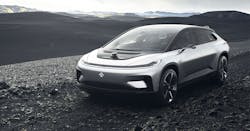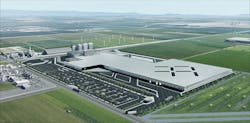Chinese Tesla Killer's Fall Threatens California Cowtown's Dream
Authors: Blake Schmidt and David Ramli
The black SUV that pulled up to an abandoned tire factory in Hanford, California, three years ago was supposed to transport the farm town into the future.
A group led by former Tesla Inc. executives brought a bundle of gutsy ideas from their new employer, Chinese tycoon Jia Yueting, who vowed to revive the 1 million-square-foot building and assemble a luxurious electric car that would surpass anything from Elon Musk.
"The community was just thrilled to have an opportunity to have life back in the plant," said City Manager Darrel Pyle, who greeted the investors with coffee and doughnuts. Hanford is in a county where the unemployment rate is almost double the U.S. average.
Today, that factory remains lifeless, hardly closer to making Faraday & Future Inc.'s cars that could go for as much as $300,000 than it was three years ago, before the stunningly rapid crash of Jia's debt-fueled business empire. It's an empire built off of a Netflix-style streaming service, whose high-flying shares Jia leveraged — a strategy that's accelerated the decline of several Asian tycoons—as he expanded into smartphones, TVs and electric cars. His Shenzhen-listed centerpiece, Leshi Internet Information & Technology Corp., surged to a peak market value of about $24 billion.
That was $20 billion ago. Jia's fortune plummeted after regulators suspended Leshi's shares for nine months and ordered him to return home and repay millions of dollars in outstanding obligations. He currently risks losing control of Leshi because of a possible margin call on his shares, which have plunged more than 60% since resuming trading Jan. 24.
Faraday, which is said to have received an additional $1 billion of funding in December, said there's been no impact from Leshi's stock plunge. U.S. court documents from a trademark action show that while Jia helped fund Faraday, his nephew Jerry Wang now partially owns it, which may help buffer the company from Jia's troubles. Wang didn't reply to a request for comment sent through Faraday's press office.
These misadventures provoke vitriol among those left in his wake, including the Nevada state treasurer, who called Jia's empire a "mirage" after the tycoon pulled out of a $1 billion Faraday factory deal there before moving on to Hanford.
"I'm willing to give Jia the credit that, at the beginning, he just believed his own fantasy," said Dan Schwartz, now a Republican candidate for Nevada governor. "But it gradually metastasized."
Jia declined to comment for this story through representatives at Faraday and his LeEco conglomerate, which includes a stake in Leshi. He controls Leshi, and U.S. court documents show he provided the initial capital for Faraday.
Faraday attracted attention in 2016 when it unveiled a 1,000-horsepower, one-seat electric car resembling the Batmobile at the CES technology show in Las Vegas. Its employees came from Tesla, Space Exploration Technologies Corp., Ferrari and BMW—and a year later the company said it had developed the world's fastest electric car.
Jia, who got his start working in IT at a local Chinese tax bureau, invested more than $300 million of his own money in Faraday. His vision involves selling the FF 91, a 1,050-horsepower electric car with a 378-mile battery range and sticker price of "less than" 2 million yuan ($318,000).
Jia's internet empire, known as LeEco, began showing cash-flow problems as early as 2016, prompting him to apologize to shareholders. The company and affiliates received $2.5 billion in lifelines last year from fellow tycoon Sun Hongbin, the chairman of real estate company Sunac China Holdings Ltd., who served prison time for embezzlement before his conviction was overturned.Yet even Sun signaled last month there were limits to rescuing Leshi. "Sometimes one also has to admit failure on a losing bet," he said.
Leshi said most of the 9.3 billion yuan in debt it reported at the end of last year will mature in 2018. That doesn't include personal financing Jia took over the years by pledging 99.5% of his stake. To top it off, Leshi said in filings that Jia's related companies owe 7.5 billion yuan in accounts receivable, a number disputed by the firms.
Jia has remained in the U.S. to oversee Faraday, defying a China Securities Regulatory Commission order in December to return and sort out obligations to Leshi—including his unfulfilled promise to give it interest-free loans. He was included in a nationwide list of defaulters the same month.
"There was no healthy cash flow into the company to support such an ambitious plan," said Teng Bingsheng, a professor of strategic management at Cheung Kong Graduate School of Business in Beijing. "It'll be hard to continue this game."
LeEco was selling assets to help repay debt to China Merchants Bank, his wife said in a Weibo social-media post in January. In the U.S., LeEco had layoffs, sold a Silicon Valley property and scrapped a $2 billion deal with TV maker Vizio Inc.
Jia's empire has been called a Ponzi scheme by Schwartz, who said Faraday had to keep finding new investors to stay afloat without ever selling a car. Tencent Holdings Ltd. co-founder Zeng Liqing also echoed the allegations in comments covered by Chinese state media. Jia previously denied he's running a Ponzi scheme, saying the allegation was concocted by business rivals—Tencent has a streaming business.
His wife said on Weibo in January that Jia, like his rival Elon Musk, is being mocked before his product is even delivered. "Is Jia Yueting a failed entrepreneur, a Ponzi scheme, just a PowerPoint?" Gan Wei posted. "That question needs time to solve."
The 55,000 residents of Hanford, an old railroad hub in the valley immortalized in John Steinbeck's Grapes of Wrath, are looking for an answer from Jia. He became Faraday's chief executive officer in December after several managers left and the company backed out of another planned factory in Vallejo, California.
Even so, Faraday is said to have secured $1 billion from an unnamed investor.
"Our funding didn't come in as expected initially, but now we are hopefully back on track," said Dag Reckhorn, the vice president of global manufacturing who helped vet the Hanford plant. "The factory is a raw diamond. We need to polish it a bit, but it's there and it's fast and it's in California."
It's not the first time Faraday declined to disclose a funding source. Schwartz, a former banker, said he couldn't get answers on how Faraday would finance the Nevada plant from scratch, which came with a $355 million tax-incentive package. California made a less generous offer. The state cut a $13 million tax agreement with Faraday that hinges on meeting employment milestones.
Jia's China difficulties haven't dinged Hanford's faith. The city is about halfway between Los Angeles and San Francisco, with a main attraction being the gargantuan, seven-scoop banana split at Superior Dairy Products Co. In December, Hanford officials met with nearby colleges to discuss tailoring their classwork to meet Faraday's needs. Pyle also said Jia's funding challenges are typical for a startup.
Pyle, who drives a decade-old Buick, was blown away when Faraday workers showed off a model EV featuring artificial intelligence and labeled as faster than any Tesla. "It was about one step next to space travel," he said.
Faraday promised the first production vehicle by the end of 2018. During a visit in late December, the only person at the plant was a security guard.
—With assistance from Pei Yi Mak and Venus Feng

